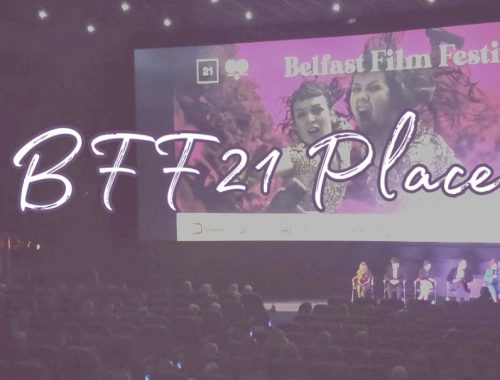Gibbs, Unexpected Placements and Me
Who’s Gibbs?
Sometimes when we use systems or structures we like to hide them, but for the purposes of this blog post I’d like to draw attention to the model of reflection I’ll be using to reflect on how I found my placement. To understand the system I’ll be using, lets take a look at this very useful photo.
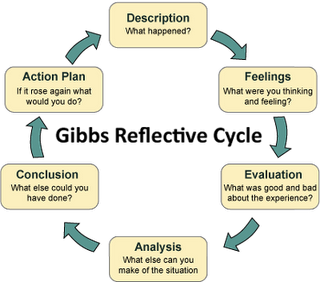
It’s simple, it’s stylish, it’s the Gibbs reflective cycle (see Jasper, 2013 for full summary). Graham Gibbs created this system in 1998, allowing for a given person to reflect not just on what could have been done differently, but asks whether there is more that can be made from the situation at hand. The University of Edinburgh has a very useful guide in their “reflection Toolkit” (University of Edinburgh, 2020), something that I also referred to. When applied to the topic of this blog post, gaining valuable work experience in the Film and TV industry, this added area of analysis helped me focus on a particularly important area of the career path – what other doors might be open. As I had one false start before entering into my current placement with Triplevision, lets go through the cycle twice to look at my unsuccessful attempt too.
From Content Writing to Content Writing
Let’s Gibb it a go
As a film student who aspires to be a writer, finding work experience that’s specifically relevant to my end goal is, for the most part, not going to happen. Becoming a writer, as I’ve been told by those I’ve spoken to about their careers, doesn’t have a set path. Production houses and TV companies aren’t putting out “help wanted: entry level screenwriter” on jobsites, let alone providing work experience in that area. Truth be told, I’m not sure what that would look like aside from me watching someone type on their computer all day and fetching them coffee.
This means that to find something that involves me using the same skillset I had to look in other areas outside of the usual box. This proved to be a long and difficult task, one that took me most of the summer until a listing was sent through the University email system came up. While I won’t name the company specifically, they are a marketing and web design entry that advertised the role of a content writer, something that I found could offer translatable skills.
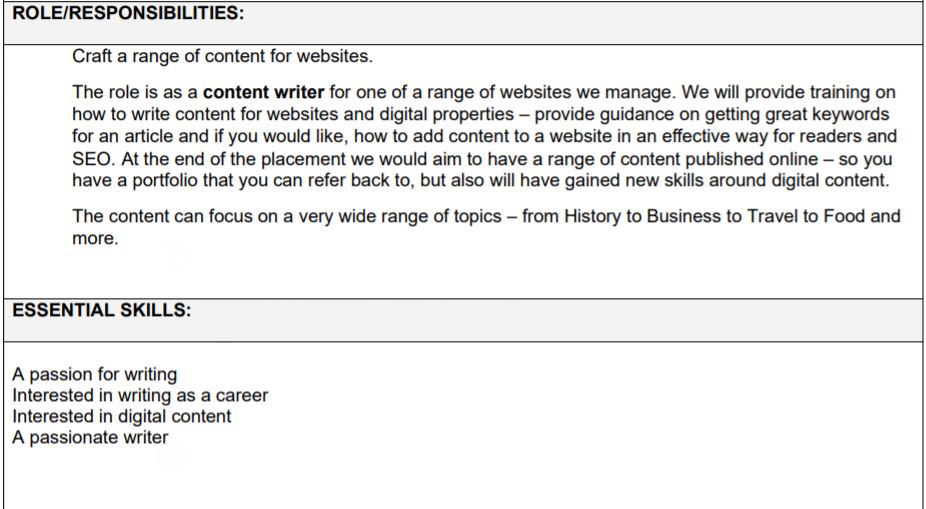
This seemed like a good opportunity to enter a placement where I would be using my writing skills on a variety of topics. While not in film and TV, it would be a sample of writing that could show I’m able to write to deadlines, and would encourage me to improve my researching skills. The fact that they had “passionate writer” requested twice could have perhaps acted as a warning sign, however.
I put in my CV and got a positive response immediately, and was given the position without an interview. Again, getting the position so quickly without an interview now seems like a warning sign, as it turned out the actual content I would be writing was far different to what was listed. After a quick introduction to the company I was given a list of topics that I could choose to write for them, however none matched the original description, instead being focussed on Instagram analytics and comparing various email marketing software.
A major fault of mine is a tendency to become complacent, even when things aren’t exactly right. Despite all the resources and lessons on securing work, and how to find the right work, I was unfamiliar with how to actually say no. Eventually I made the decision to explain why I wasn’t best equipped to write about that content, and began to search elsewhere. Thankfully contacting my lecturer led to me to contact Triplevision, a documentary production company.
After another week or so of emails, modifying my CV and sending it on, I went for a fairly daunting interview at Triplevision. After a last-minute cancellation from Eamonn, my sole contact, I was told that the interview would instead be done by two others. Thankfully things went well, and after a successful interview I managed to secure myself a place at Triplevision.
That’s what happened, but how did I feel looking back on it? This is perhaps the hardest element of reflection for me, as generally speaking I’m pretty happy as long as I eventually manage to accomplish what I set out to do. My experience with the marketing and web design company was definitely one of the more difficult experiences to navigate emotionally. While it wasn’t an ideal position, I at least felt that I had gone through the right channels and made a solid decision in applying for the company.
To find out that the actual job was not only very different from what was posted, but was also about complex topics I had no prior knowledge about, was quite a shock and very daunting. As I said previously, I can be quite complacent in less than ideal situations, and so it did take me a good few days before I made the decision to opt-out from that placement, which did waste time I could have used at least looking at other options. There is a very distinct failure that comes with having to back out of what was meant to be a success, but I do feel that had I stayed on, I would have been fairly miserable and stressed. Perhaps more importantly, this blog post would have been a lot more bleak (and I can be fairly bleak at times, I’ll admit).
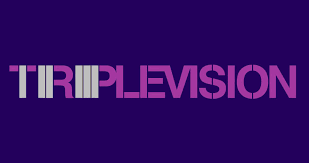
Being introduced to Triplevision after what was a very conflicted few days was a huge relief. I knew I had the right skills to be there, and that I was in with a good chance. I was also very glad that I had my aspirations included on my cv, as my position at Triplevision has me outlining scripts as well as researching and pitching ideas – things I never thought I’d get to do on a placement. By the time I was sat down for an interview my nerves had mostly gone. Having two people and an Ipad camera pointed at you is fairly nerve-wracking, but I think the fear of not getting any placement at all settled me, strangely.
Ultimately, the lessons I learned were very different to what I expected. The biggest one: no matter how sure you are about a position, it never hurts to ask some specific questions. I think my go in interviews will be something along the lines of “what will a typical day be like?”, just to make sure.
References
Jasper, M. (2013) Beginning reflective practice. Andover: Cengage Learning EMEA
University of Edinburgh Reflection Toolkit (2020), ‘Gibbs Reflective Cycle’, last accessed 22/11/2021. Available at: https://www.ed.ac.uk/reflection/reflectors-toolkit/reflecting-on-experience/gibbs-reflective-cycle
The 11th Hour
You May Also Like

Learning from experience- Am I on the right track?
28 November 2021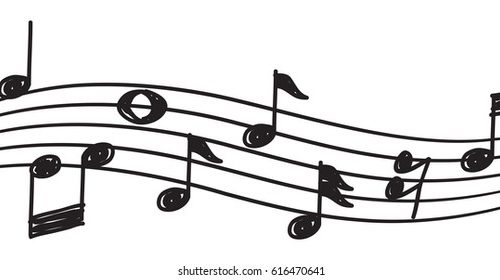
First Day Fears
24 November 2021